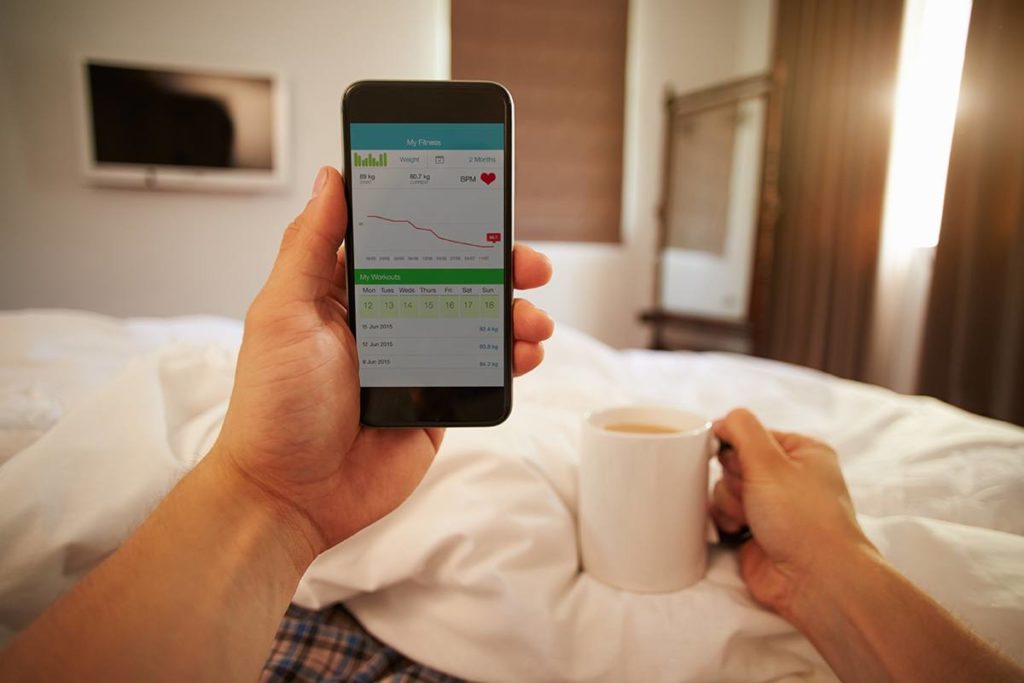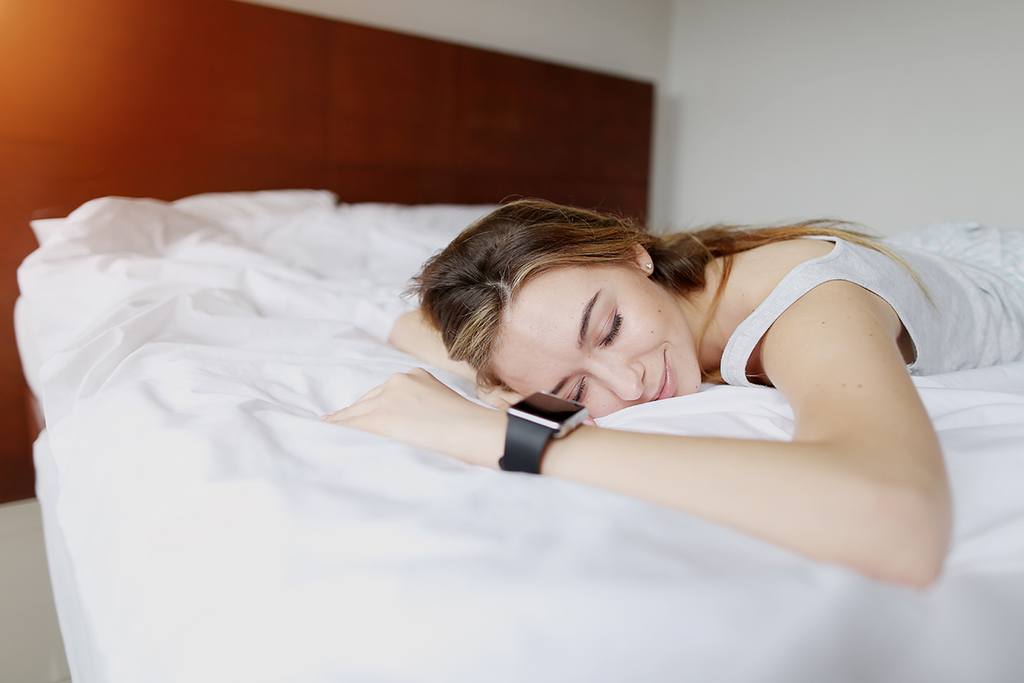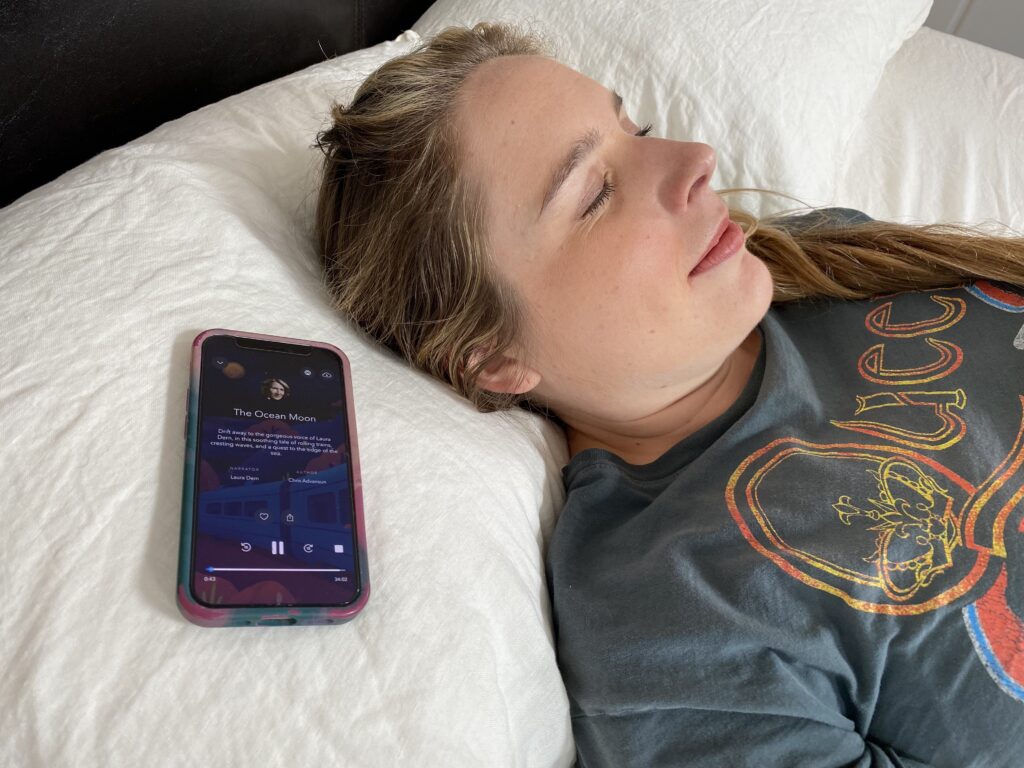Sleep plays a critical role in your physical and mental health. It helps prevent illness, lowers your risk for chronic conditions and improves brain function. Investing in a sleep tracker or app can be a great way to learn about your sleep habits and identify any areas for improvement.
Sleep trackers and apps offer numerous health benefits, but like any wellness tool come with pros and cons. Here’s how to determine whether or not a sleep tracker or app is right for you.
What are Sleep Trackers?
Sleep trackers are devices that collect data about your sleep patterns. While you sleep, sleep trackers measure your sleep duration, sleep quality, sleep phases, movement and/or heart rate.
Some sleep trackers also measure environmental factors that can impact sleep, like how much light is seeping into your bedroom or the overall temperature of your sleeping space.

Different Types of Sleep Trackers Available
Most sleep trackers come in wearable device form such as a wristwatch or a ring. These tend to be the most popular buys and include brands like Fitbit, Apollo TM and Apple Watch.
There are benefits and drawbacks to wearable sleep tracker devices. On the plus side, they can directly measure your heart rate (which rises and falls with sleep stages). Many sleep trackers can also be used to track exercise, send and receive text messages, and take phone calls.
While plenty of wearable devices are versatile for both sleep and everyday use, these sleep trackers also tack on several cons. Not everyone finds wearing a sleep tracker comfortable, and they can also serve as a constant reminder or pressure for the need to sleep. This, in turn, can actually negatively impact sleep.
Bedside devices are another option for sleep trackers. These systems typically use contactless sensors to measure sleep quality and sleep stages, movements and/or breathing patterns.While they offer a much more comfortable alternative to wearables and still manage to track data, bedside devices tend to be the most expensive type of sleep tracker on the market.
How Sleep Trackers Work and Collect Data
While it may seem complicated, sleep trackers operate on a rather simple process. They measure your movements, breathing and/or heart rate to make educated guesses about your sleep patterns. This can tell you how long you slept and the quality of your sleep.
Benefits and Limitations of Using Sleep Trackers
Since our movements, breathing and heart rate changes with different sleep stages, sleep trackers can make fairly accurate predictions about our sleep patterns. Still, these are just predictions, meaning sleep trackers can over or under-estimate how well you actually sleep. While research is limited, studies show that sleep trackers are only accurate 78% of the time.
Things to Consider when Choosing a Sleep Tracker
No two sleep trackers are made the same. Here’s how to find a sleep tracker that’s right for you.
Factors to Consider when Selecting a Sleep Tracker
There are a few things you’ll want to consider when comparing different sleep trackers. First, it’s important to choose a reputable and trusted brand for a tracker with the most accuracy. You can also read verified customer reviews to get a sense for whether a tracker holds up to its promise.
Next is comfort and battery life. If you’re sensitive to sleeping in jewelry, for example, you may want to lean towards using a sleep app or a bedside device over a wearable sleep tracker. Be sure to check battery life as well to determine how often you’ll need to charge your tracker.
Budget and value are another major consideration. At the end of the day, sleep trackers aren’t cheap, and can cost you anywhere from around $80 to several hundred dollars. For a more budget-friendly alternative, you may want to consider a free or low-cost sleep app.
Lastly, determine why you want to use a sleep tracker. Do you wake up feeling tired despite a full night of rest? Are you struggling with insomnia? Your current sleep situation and state of sleep can help you determine whether or not a sleep tracker can add value to your life.

Risks of Getting a Sleep Tracker
Sleep trackers can lend valuable insights about your health, but they can also lead to unhealthy habits. The biggest risk of using a sleep tracker is orthosomnia, or an unhealthy obsession with getting perfect sleep. This can lead to sleep anxiety that can in turn keep you awake at night.
Sometimes, sleep trackers can worsen insomnia or deter you from getting medical treatment, especially if you begin to rely on your sleep tracker as a treatment for a true sleep disorder.
Sleep trackers can also promote poor sleep hygiene, or bedtime habits. They often encourage nighttime screen use before bed either on the tracker itself or on a sleep smartphone app.
Features and Functionality of Sleep Trackers
While certain sleep trackers measure different traits, here’s how they can typically be used.
Common Features of Sleep Trackers
The majority of sleep trackers will provide specific details about your sleep. This includes sleep duration, or how long you slept; when and how long you spent in different sleep stages (which is particularly important for measuring deep, restorative sleep); and your sleeping heart rate.
Some sleep trackers can also detect snoring and signs of other sleep disturbances. If you share a bed with a partner, for example, this can be a helpful trait to track and be aware of.
Advanced Features and Additional Metrics to Look For
More advanced sleep trackers offer additional features that can lend you deeper insights.
Some high-end features to look for include sleep quality analysis, which often includes a detailed report of your sleep cycles; sleep scores that grade your sleep (such as a B+ or 87%); smart alarms that wake you in your lightest sleep phase; and sleep coaching for custom advice.
Integration with Other Devices and Apps
If you’re a fan of integrated devices, you may want to seek out a sleep tracker that can be integrated with your smartphone, Amazon Alexa or online health platforms. This allows you to access your sleep insights anywhere, anytime and keep all of your devices connected.
Using Sleep Apps for Sleep Improvement
Sleep apps are an alternative to sleep trackers. Here’s how they can improve your sleep.
Overview of Sleep Apps and their Benefits
Sleep apps can be used in several different ways. They can work alongside wearable devices by collecting and analyzing data, or offer sleep education, tips and relaxation strategies.
When compared to wearables, sleep apps often give more information on how to learn healthy sleep habits for life, but they often won’t net you the same data as wearing a wristwatch or ring.
Different Types of Sleep Apps Available
While there are numerous free and paid sleep apps available, three of the most common types that you’ll find on iPhone and Android are tracking apps, relaxation apps and meditation apps.
Tracking apps typically work with a wearable or bedside device and analyze your sleep data, giving you a comprehensive sleep report that you can access through your smartphone. Relaxation apps can offer a wide range of relaxing content to help you fall asleep that includes soothing bedtime stories, music or sounds that lull you to sleep, and sleep-inducing videos.
Meditation apps, meanwhile, use research-proven deep breathing and mindful meditation to help you relax and fall asleep. You can follow these programs on your phone before bed.
Recommended Sleep Apps and their Unique Features
One of the most popular sleep apps is Calm, which is known for its “breath bubble” breathing exercise that helps you learn deep breathing for sleep.
Sleep Cycle is another popular sleep app that works by monitoring movements while you sleep, but you’ll need to keep your phone near your bed. By doing so, it can gauge when you enter your lightest sleep phase and then wakes you up at what the brand calls the “perfect time.”

Headspace is a third top choice. This sleep app is dedicated to guided meditation programs that you can do both during the day and just before bed to help you get a good night’s rest.
BetterSleep is also a fan-favorite for its sleep recorder and tracker feature. This technology is trained to recognize different sounds associated with sleep, which is then analyzed into a report.
How to Effectively Use Sleep Apps to Improve Sleep Quality
Sleep apps can be a great way to get insights about your sleep. For example, you may think you get the recommended 7-9 hours of sleep, but a sleep app can tell you if that number is higher or lower than you initially thought (still, remember sleep apps aren’t 100% accurate).
With this insight, you can make positive changes to your bedtime habits, such as going to bed one hour earlier. You can also learn effective relaxation strategies like deep breathing and meditation. These can be used for more than just sleep and can help you reduce stress levels.
However, be mindful of how much time you spend on sleep apps just before bed, since blue light exposure has been linked to worsened sleep – another potential drawback of these apps.
What Does a Sleep Tracker Tell You?
A sleep tracker can share valuable information about your unique sleep habits. Here’s how to make the most out of your sleep tracker reports and what different sleep metrics measure.
Common Sleep Metrics and What They Indicate
You’ll want to be aware of sleep metrics terminology to best understand your sleep tracker data. The most common sleep metric that sleep trackers measure is sleep efficiency, or the ratio of total time spent asleep to total time spent in bed. This can tell you how long and well you slept. Another regular sleep metric is sleep latency. This is how much time it takes to fall asleep. Some sleep trackers also tell you how much time you spend in REM sleep, an important sleep stage that facilitates memory consolidation. This stage is also closely associated with dreaming.

How to Interpret Sleep Data and Make Meaningful Changes to Sleep Habits
Most sleep trackers will give you an easy-to-understand breakdown of your sleep data that can include charts, graphs and/or sleep curves. The key is knowing what to do with that data.
If you find that it’s taking you a long time to fall asleep, this could be an indicator that you’re not spending enough time winding down before bed. To lower your sleep latency, for example, you can swap bedtime habits from watching TV (which emits blue light) to reading a book instead.
More advanced sleep data can also clue you in on environmental factors like light exposure or a too-hot bedroom that could be impacting your quality of sleep. You can then take steps to alleviate these issues, such as investing in blackout shades or lowering your temperature.
Tips for Better Sleep
60% of sleep tracker users made some sort of lifestyle change since using their sleep tracker, a recent Mattress Clarity survey found. However, data alone isn’t always enough for a change.
While using a sleep tracker or app can be helpful, you’ll want to practice good sleep hygiene as well to learn healthy sleep habits for life. These are tried-and-true tips for getting better sleep:
- Avoid blue light exposure before bed by limiting screen time
- Keep your room dark, cool and quiet (ear plugs and eye masks can help)
- Avoid consuming alcohol or caffeine close to bedtime
- Don’t eat large or high-fat meals prior to going to sleep
- Go to bed at the same time every night
- Make sure your bed feels comfortable
- Get regular exercise during daytime hours
The Takeaway
If you’re struggling to fall or stay asleep, a sleep tracker or app can help you learn about your sleep patterns and pinpoint areas for improvement. After all, sleep is essential to your overall wellness, so it’s important to understand if your sleep habits could use some extra attention. Be sure to use a sleep tracker or sleep app from a reputable, trusted brand, and consider your needs, budget and comfort before deciding which wellness tool, if any, is right for you.

